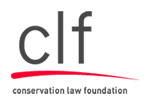Conservation Law Foundation
 |
|
| Abbreviation | CLF |
|---|---|
| Formation | 1966 |
| Purpose |
Clean Energy Climate Change Clean Water Healthy Forests Smart Growth |
| Location | |
|
President
|
Bradley M. Campbell |
|
Budget
|
FY2004: $3.5m in grants & donations |
Conservation Law Foundation (CLF) is an environmental advocacy organization based in New England. Since 1966, CLF's mission has been to advocate on behalf of the region's environment and its communities. CLF's advocacy work takes place in four program areas: Clean Energy & Climate Change, Clean Water & Healthy Forests, Healthy Oceans and Smart Growth. CLF works to promote renewable energy and fight air and water pollution; build healthy fishing communities and protect marine habitat; fight sprawl, promote public transit and defend public health. Conservation Law Foundation is a nonprofit, member-supported organization with offices in Maine, Massachusetts, New Hampshire, Rhode Island and Vermont.
With offices in nearly all New England states (Connecticut being the only exception), CLF works to solve the most significant environmental problems that threaten New England. CLF’s strategies of advocacy concentrate on areas of law, public policy, economics, and science. Employing a staff of attorneys, CLF’s efforts of environmental protection often include the use of lawsuits, petitions, motions, and affidavits. Through these strategies, CLF seeks to both support local initiatives and promote government accountability and transparency. As a result, CLF works to bring local environmental concerns to the attention of legislators and policymakers, and serve as a resource for communicating these concerns throughout the region.
Founded in 1966 to stop the development of ski slopes on Massachusett's highest peak, Mount Greylock, CLF expanded its advocacy to address both environmental and community issues in all six New England states.
In 1977, the organization successfully fought the expansion plans for a federal divided highway through Franconia Notch, in New Hampshire's White Mountains. Since that time, CLF's legal advocacy has focused on several natural resources cases, including the cleanup of Lake Champlain (by challenging state stormwater permits), the prevention of overfishing of groundfish--cod, haddock, and flounder—off the coast of New England (resulting in a settlement requiring the National Marine Fisheries Service to produce a management plan to eliminate overfishing), and the protection of the Vermont black bear habitat (by obtaining a federal court injunction halting destructive U.S. logging practices in southern Vermont's fragile Lamb Brook wilderness area, marking the first time an environmental group in the Northeast successfully challenges the U.S. Forest Service's clear-cutting policies).
...
Wikipedia
